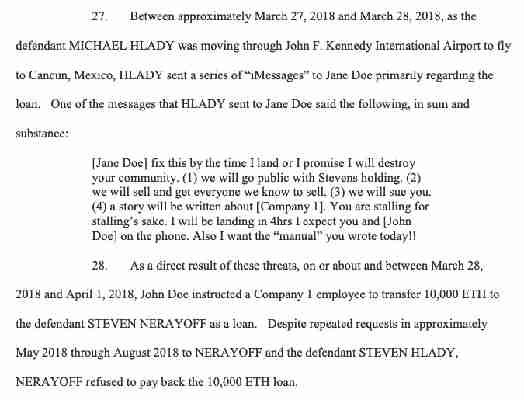Two individuals in the US, including a former advisor to various blockchain projects including Ethereum, have been arrested for their alleged role in a series of multi-million dollar cryptocurrency extortion.

According to a Department of Justice statement , former Ethereum advisor Steven Nerayoff and Michael Hlady were arrested after supposedly threatening to “destroy a startup cryptocurrency company if they were not paid millions of dollars” worth of Ethereum.
“As alleged, Nerayoff and Hlady carried out an old-fashioned shakedown, to be paid off with 21 st century cryptocurrency,” United States Attorney Richard Donoghue said in the statement.
The targeted company was an unnamed Seattle-based startup that uses cryptocurrency to reward customer loyalty. The unnamed company makes blockchain-based products for those looking to generate and reward user traffic.
The allegations are being lodged against Maple Ventures, an offshoot of Alchemist LLC , a blockchain consultancy founded and headed-up by Nerayoff, CNBC reports .
It’s also worth noting that Nerayoff was pivotal in constructing the legal architecture behind Ethereum token offerings. On his own website he claims to have been called the “Architect of the ICO.” One of his most recent ventures, – which he co-founded – CasperLabs, debuted its scalable, proof-of-stake blockchain on its testnet earlier this year.
Credit: StevenNerayofom
The first extortion
In July 2017 , the unnamed firm planned an initial coin offering (ICO) as a fundraising mechanic and signed a contract with the organization operated by Nerayoff.
Under said contract, Nerayoff agreed to help deliver the ICO in exchange for 22.5 percent of all funds raised, and 22.5 percent of the issued tokens. However, just days before the ICO was due to commence, Nerayoff allegedly demanded more from the firm.
According to the DoJ statement, Nerayoff asked that his share be increased by 17,000 ETH, from the originally agreed 13,000 ETH. This would have given the accused $8.75 million worth of Ethereum at the time.
Nerayoff is accused of threatening to destroy the company if it didn’t comply. The firm paid – but it said it didn’t receive any further services from Nerayoff or his organization.
The second extortion
The firm was then introduced to one of Nerayoff’s associates, Michael Hlady, who was described as being the “operations guy.” Hlady told the claimants that he had been part of various government agencies, including the NSA and CIA. It’s claimed he also said he had “taken down” a head of state
In March 2018, Nerayoff demanded a loan of 10,000 ETH (about $4.45 million at the time) from the Seattle-based company. Hlady is said to have followed up Nerayoff’s demands with text messages further threatening to “destroy the company‘s community.”


Following the threats the company obliged but the loan was never repaid. Here’s where the allegations take an even darker turn.
According to the DoJ complaint document , the claimants allegedly stayed at Nerayoff’s home in New York after being unable to travel due to adverse weather.
The complaints allege that both Hlady and Nerayoff entered the claimant’s bedroom during the evening, making threats and demands for more money.
Nerayoff appeared in court yesterday, and has been released on bail for $750,000. Hlady also attended court yesterday and has been further ordered to appear again next week, CNBC reports .
While the notion of this old-school shakedown is quite terrifying, the charges laid out before Nerayoff and Hlady are allegations and the pair are yet to be found guilty. If they are, the duo could face a maximum sentence of 20 years imprisonment.
Want more Hard Fork ? Join us in Amsterdam on October 15-17 to discuss blockchain and cryptocurrency with leading experts.
‘Unregulated ICOs are dead’ — welcome to the era of the STO
One of Alan Sugar’s earliest apprentices and author of Tokenomics: The crypto shift of blockchains, ICOs and tokens , Thomas Power took to the seats of the Hard Fork Decentralized Exchange this afternoon to discuss his vision of our blockchain future.

The founder of 9 Spokes and Blockchain Industry Compliance and Regulation Association (BICRA) board member believes that the era of the unregulated initial coin offering (ICO) is over.
“Unregulated ICOs are dead,” said Power.
But this isn’t necessarily a bad thing, when one door closes, another one opens. Power believes that what we have learned from the last few years from ICOs is taking us forward into a new era, one that is potentially more sustainable. This is the era of the Security Token Offering (STO).
The key difference being that STOs are secure, regulated, and distributed under a legal framework. In this case, regulation is vital to a token’s proliferation.
Drawing parallels to the dot com boom of the late 1990s and the blockchain world of today, Power said, “there were about 5,000 dot com businesses, there are about 5,000 [altcoins] now. But Amazon is still here, the internet didn’t end.”
Indeed, even though there has been a near 90-percent crash in the price of cryptocurrencies since the start of the year, Bitcoin is still here, and blockchain development is still taking place. What we are witnessing with the death of the ICO, is the start of the STO era and a rationalization of the market.
There were many companies like Petom that raised huge amounts of money in the dot com boom, but failed to become profitable and soon went bankrupt. But some were able to develop business models that supported the prevailing digital economy of the time to succeed.
If history is then to repeat itself, it’s probably safe to say that many cryptocurrencies will indeed continue to exist, but not all of them and not in the way they do now; importantly their dynamics and economics will need to evolve.
Beyond having speculative value they must have a real world use and value that plays a vital role in the entire supply chain of a business.
Walmart wants to track lettuce on the blockchain
Walmart is asking all of its leafy greens suppliers to get on blockchain by this time next year.

With instances of E. coli on the rise, particularly in romaine lettuce, Walmart is insisting that its suppliers use blockchain to track and trace products from source to the customer.
Walmart notes that, while health officials at the Centers for Disease Control told Americans have already warned citizens to avoid eating lettuce grown in Yuma, Arizona, it’s near impossible for consumers to know where their greens are coming from.
On one hand this could be a great system for reducing waste. Earlier this year, green grocers had to throw away produce thought to be infected with E. Coli.
The announcement states, “[h]ealth officials at the Centers for Disease Control told Americans to avoid eating lettuce that was grown in Yuma, Arizona”
However, it’s near impossible for consumers to know where their lettuce was grown.
It would seem that most producers and suppliers still rely on paper-based ledgers. As a result, tracking down vital information about where a product came from can be very time consuming.
By which time, it might be too late and many customers might have purchased and consumed infected produce.
If Walmart’s plans come to fruition, it would allow customers to view the entire supply chain of a product at the point of purchase.
Hopefully, the greater transparency will also make farms take further health and safety precautions. Now that any indiscretions can be quickly traced directly back to them.
Tons of corporates have recently expressed interest to use blockchain tech to track various products – like orange juice or almonds . We’re yet to hear about the results such pilots breed, but as some have previously said: not every use case is suitable for blockchain .
If you’re interested in everything blockchain, chances are you’ll love Hard Fork Decentralized. Our blockchain and cryptocurrency event is coming up soon – join us to hear from experts about the industry’s future. Check it out!











